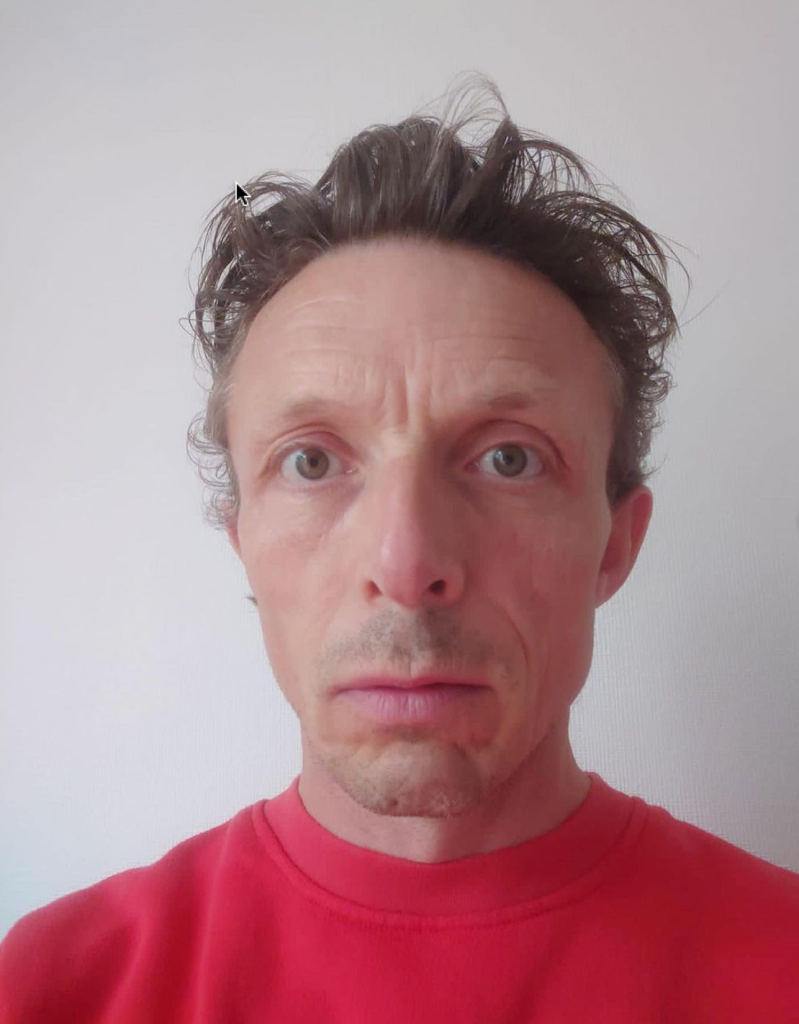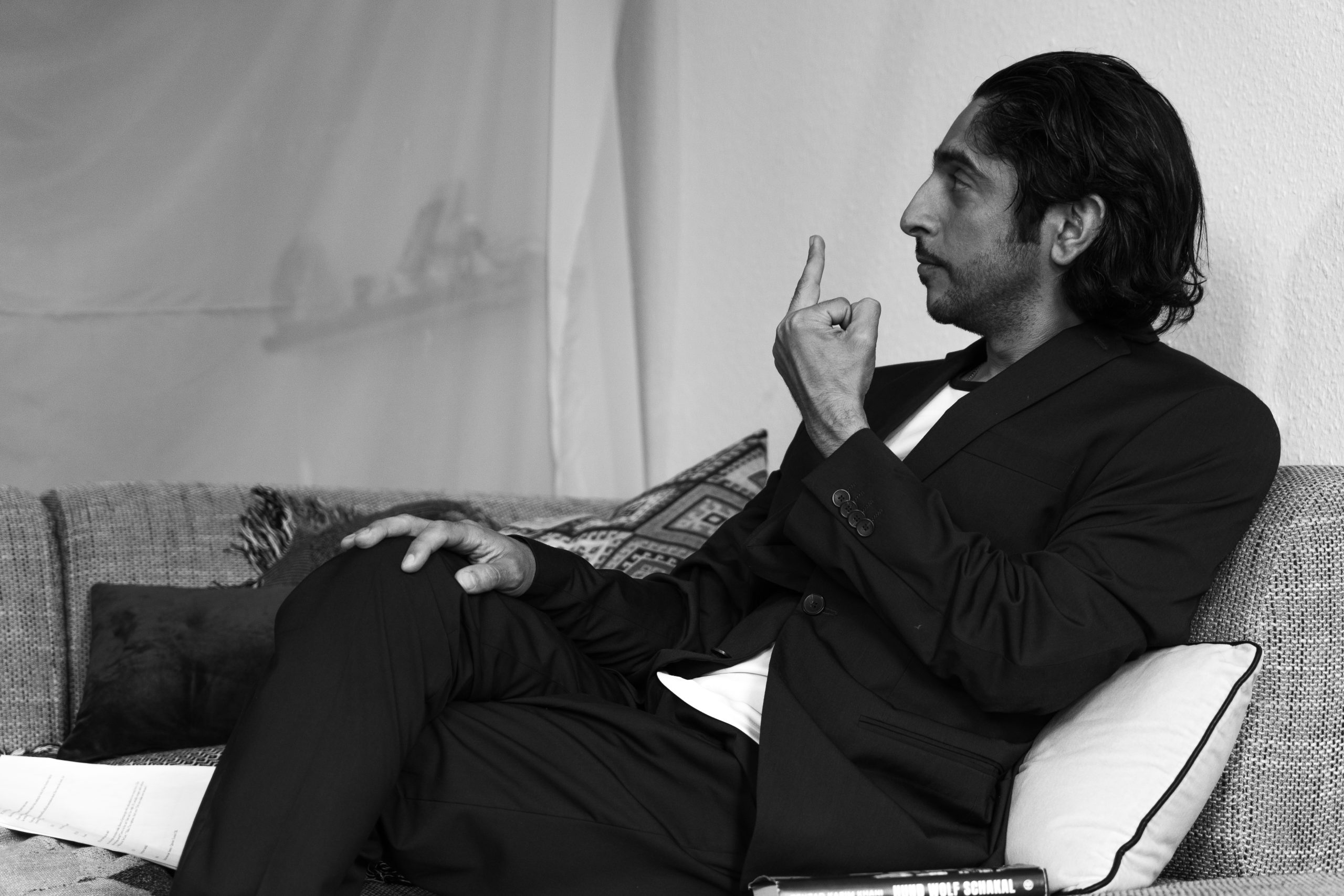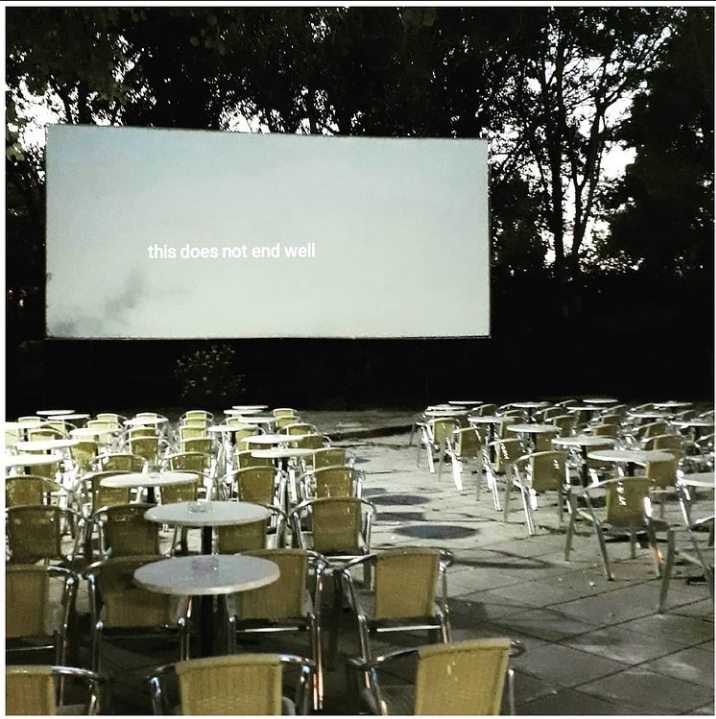Murder 24/7 is the new album from the utterly brilliant doom-wop, goth-dwelling Jacob Yates and The Pearly Gate Lock Pickers. It’s been a few years since their tremendous ‘Goths’ record, and ‘The Hare, The Moon, The Drone’, but finally, we have more to mope over. Murder 24/7 initially stemmed from the recent COVID lockdown, inspired by a BBC documentary, entitled… Murder 24/7. The themes of this record may not be for those who are uncomfortable with ‘heavier matters’, but Murder 24/7 does contain the kind of macabre poetry and dark humour to reflect the times we’re living in. It’s a truly brilliant album, and another example of just how terrific this group continue to be, and why we need them more than ever.
I had the pleasure of interviewing frontman and lead songwriter Jacob Lovatt a few years ago, and here we are again. It’s good to pick the brains of those you hold in high regard.
This time round, Jacob kindly agreed to indulge me further. In the following Q&A, I had the chance to interrogate him about Murder 24/7, delve deeper into his views on the human psyche, his evolution as a musician and songwriter, the constant restraints, as well as our common admiration for Barbie.
RJ: Mr Jacob Lovatt, thanks for taking the time to talk to me again. Apologies but I must start this interview stating I’m feeling a little drained as I’ve not long just finished Oppenheimer. It took up most of my day, felt like years.
JL: I haven’t seen it. I kind of meant to, but I thought it’d be lots of men mumbling. I want to go see it. It’s an amazing subject and the sort of the classic quote, “I’ve become death destroyer of worlds.” It’s kind of what it’s all about, you know, you just want to see that line delivered.
RJ: Yes – lots of guys mumbling very important discussions. Truth be told, I had more fun watching Barbie, especially when my wife turned to me at the Godfather reference being ‘mansplained’ and said, it’s YOU!”
JL: Oh, I loved it. I absolutely loved Barbie. I remember sitting watching Barbie, sitting next to my daughter and sort of that whole realisation of thinking, ‘yeah, it’s a pretty horrible world’. I mean, I knew that already that but to have it hit home to you in a sort of blockbuster style… the bit where they’re all playing guitar on the beach – my daughter just went, ‘that’s you’. And I was like ‘what? I’ve never done THAT!’.
RJ: But enough of our film reviews as we’re mainly here to talk about Murder 24/7, the new, long-awaited 4th Jacob Yates and the Pearly Gate Lock Pickers album. Can I get my only negative out the way first?
JL: Why is it only six tracks long?
RJ: How the hell did you know I was going to open with that?
JL: Everyone’s gonna say that.
RJ: Sorry. I’m predictable as always. Are the reasons again down to money, resources, time, band availability?
JL: It’s kind of horrible, really, it’s all of that. I live in St. Andrews, some of the band, you know, live in Glasgow. To get together over the last sort of few years has been tricky. Also, we had lockdown and all the rest of it. So, that’s one of the reasons, the band’s kind of a bit disparate. And then getting us together for the time we need to record, it’s quite often the case of, ‘let’s just go in the studio and see what happens’. That’s my kind of opening. I booked two days or three days [in the studio] and was like ‘let’s see what happens’. But then we’ve got those five songs, obviously one’s a remix. And we were like, ‘well, what do we do?’ Do we put out as an album or call it an EP? I mean, who really gives a shit? But in the end my point was… like David Bowie, for example… my favourite album is Station to Station, that’s only six tracks. I can learn everything from it.
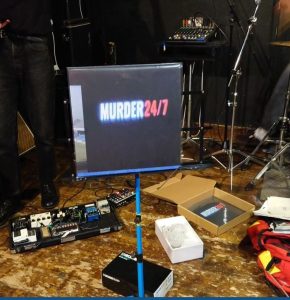
RJ: I sent the album to a friend (prior to release, apologies), and I was like, “urgh, we’ve waited so long for another Jacob Yates album and it’s only six tracks long”. But to his credit he replied, “Nah mate, it is what it is, that’s pure fucking punk, that’s pure”. Maybe he’s right, but I’m just greedy I suppose.
JL: There is a part of me that says you do get what you’re given. I don’t want to go, “Well, let’s just bang out of the track for filler”, that’s not how it works. Have I been guilty with that? I suppose not so much in the past. But you do feel sort of pressured to get eight tracks or whatever down, like on ‘Goths’.
RJ: How about this time round with Murder 24/7 – tell me about the approach.
JL: We had the concept, I had a lot of sketches, but we had less time. I wanted it to be true to the concept of what I’d wanted, what I was hearing in my head. I wanted to really concentrate and get it sounding the way I wanted. That’s almost another constraint. I wanted all the songs to be about murder and particularly sort of driven by the the TV documentary. So, most of the songs are about or link to that. The only one that isn’t is the ‘Killing of Joss Stone’. Joss Stone had been a kind of a bit of a love hate relationship, well ‘a hate-hate-love-hate relationship’ that we’d had for a while, me and Chad (Haddow) and Rick (Holmes). Years ago, we played an acoustic show in Mono where we just sat around a table with some bottles and we had a picture of Joss Stone then just because it felt kind of like a kind of… well you know how she’s kind of that ‘white soul goddess’. We were kind of taking the ‘mickey’ out of it a bit there.
RJ: The Killing of Joss Stone was an interesting one for me as I had to Google who she is, I’d forgotten. What’s the tale behind that tune?
JL: It’s the only song on the album where there isn’t actually a real murder. But there was a plot to kill her. And what happened was that two guys (both were suffering from mental illness of some kind) got it into their head that she was some sort of like ‘lizard princess figure’ and that she needed to be exterminated. They found out where she lived in Devon. But they didn’t know exactly where so they kind of drew a hand-drawn map. On the inside sleeve is my artwork – a hand-drawn map of where Joss Stone’s house is. But off these guys went from London in a Fiat Punto, to go and do ‘the job’ and they got lost in Devon and asked a postman, “do you know where Joss Stone lives?” – The postman looked in the back of the car and saw a samurai sword and a body bag. He phoned the cops and they got lifted. In my song it’s an imagination of how they go through with it. That’s the only one that kind of drifts out of the concept.
RJ: How about the rest of the record, how much was there that didn’t make the final cut?
JL: The other part of the concept and the other part around the six tracks for me is that I was only going to release it digitally. The thing was going to be a digital release on Bandcamp, most likely. And what my thoughts were was that every time I wrote a song about murder that fitted with, and we recorded it, that fitted with that kind of concept that it would just get added on. Effectively the album never ends. It’s like Murder 24/7! It doesn’t ever stop. And that’s still the concept. I’ve just recorded two new songs that will go onto the album, but they won’t be available vinyl, but they’ll be available digitally. I hadn’t really got more lyrics down when we went into the studio, but I had some ideas that I wanted to do, which we just didn’t. Unfortunately, as soon as we came out of the studio, I wrote a song called ‘The Fire Escape’, which is almost like a segue between the main ‘stories’ in the program. It’s like this little, tiny kind of ‘incidental’ murder, which is kind of the weird thing about this program anyway. It’s very mundane murders. But this one [Fire Escape] is about a guy that gets caught on CCTV going into a care home where his mother is resident. He creeps up the stairs and then you see him kind of crossing the top of the stairs carrying a bundle of sheets. And he’s basically carrying his mum and then just throws her off the fire escape into a skip. And that’s probably almost one of the most shocking parts of the programme, but it’s almost like a little, you know, filler between the two main stories. I was like, “what am I watching here?”.
RJ: Like you say the records main idea obviously stemmed from the BBC crime show, but how did it evolve into thinking, “Let’s do a record about this?” – It was you and Chad Haddow who decided?
JL: We kind of started off both watching it and we’d message each other on WhatsApp or whatever. “Are you watching this?” And like, “yeah, this is mental”. It’s got this kind of like home bedroom style studio dub reggae soundtrack. And then it’s less like really kind of like stark harrowing murder kind of detective show. The things like the titles came, the first murder is ‘Operation Cromwell’ and the lyrics were just there. And then the actual, like the title for the program, the black screen with the murder 24/7, the way it was written, I was thought that’s a perfect album cover. As if it’s already done, you know? It just grew from that. ‘Black Nike Tracksuit’ is kind of roughly loosely based on the TV show, but it’s also got a bit of autobiographical stuff around Dundee in it – my growing up, but the two things kind of merge. It’s more about the kind of person that’s perpetrating murder and what’s going through his head or her head as character. It sort of just grew from that and it kept on growing and still is, I suppose.
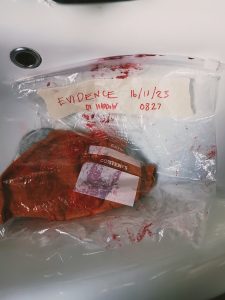
RJ: As with all your music I’ve always found dark humour – even though the subjects are very ‘heavy’. You know the line from ‘Goths’ album and the song ‘Bits of Glass’ I obsess over, it talks about the dad who ‘..hanged himself in the woods with a dog looking on..’ I find that kind of line profound but darkly comic… maybe it lies in me hoping the dog has a more fortunate future, which makes me laugh given it’s a suicide having just taken place.
JL: Yeah, I mean that’s what it is, it’s set up with lines like that. The line “I still love you … I’m the Crime Scene Manager” is basically trying to kind of get the band playing beautiful music and then they hear that and go, “What?”. It sort of sets them up. I’m trying to make them [the band] laugh initially and then I know that it’ll work with the audience.
RJ: Awful question but – do you ever just feel like just sitting down and writing a two-minute Phil Spector love song?
JL: I think there’s enough of that already, so I think that’s the thing. No, it’s almost like we’re sort of striking the balance, there’s got to be something that balances out Coldplay, and there has to be something really dark in order to kind of like alleviate that. There’s tons of things that I will write songs about and there is the usual kind of ‘go-to stuff’. Who knows what will come up next?
RJ: That’s enough mentioning of Coldplay, please. To make Murder 24/7 must have been done minus a ‘producer’ as such? How much does Green Door Studios make things easier?
JL: No, it’s me, it’s usually me and the rest of the band, and then, well, for all the albums we’ve done, it’s been Emily McLaren and Stu Evans in the [Green Door] studio and in engineering. But they totally get it as well. It’s like you’ve got two other members of the band going along. Now they’ve moved over to the States, it’s a bit more difficult now. Although this was mixed by them in the States. There’s Ronan [Fay] from Sweaty Palms that works in Green Door and he was helping in the studio on the album. We got to know him and again, he just buys into it. We’ve been kind of training him up to stand in on guitar for Chad on some occasions as he’s just had a new baby. But it’s great to have another member of the band now.
RJ: Back to what I mentioned about preparation – there can’t be much chance or is there?
JL: I hadn’t written everything on ‘Goths’ before we went to the studio, quite a bit, but not all of it. For ‘The Hare, the Moon, the Drone’, I hadn’t hardly written anything, and Murder 24/7, I hadn’t done much. I had some lyrics for ‘Operation Cromwell’, and ‘Kelly King’. But again, I knew what I wanted to say. It was more about being able to get the influences of the music I was listening to, and the things I wanted to hear on the record. That was the kind of key. I wanted it to be pretty dub orientated. I knew I wanted to have lots of sort of Two Tone, Fun Boy 3, Terry Hall in it, a lot of Andy Weatherall kind of ideas in it, lots of stuff that was influencing me. I just want to make sure this [record] kind of stands up to scrutiny, my own scrutiny.
RJ: The kind of reporting style of songwriting interests me. Where does that come from for you?
JL: The kind of reportage style has always been part of things since when I was Uncle John and Whitelock. It’s where that kind of reference to Child Ballads and Broadsides and all these things comes from. I love the Child Ballads. It’s like 400 or more of these songs from hundreds and hundreds of years ago. But I’m not a folk traditionalist who’s going to pick up and start singing those songs. I know the bands do that already. I like writing my own lyrics. Even on Murder 24/7, it’s a bit like the Child Ballads. There’s no moral standpoint. I’m not saying that, “aren’t people awful because they take drugs and end up murdering people.” That’s not what it’s about. It’s about the human condition, which you picked up on before. It’s about where we go as people. I kind of feel like it’s quite nice to keep that tradition going somewhat, you know? And a lot of the Child Ballads are way darker than anything I’m writing.
RJ: The sound of the PGLP’s has maintained throughout each album, but there’s clear evolution.
JL: It’s kind of like it’s moved from being a sort of an Americana kind of thing with a bit of country and stuff to a more British sound. It’s kind of moved across the Atlantic. I always sort of considered the first couple of albums mid-Atlantic. And then the last album and Murder 24/7 have been a bit more moving towards that kind of more that British influence. Looking at things like the dub and the two-tone and some of those influences are much stronger now. And the folk stuff as well, there’s no getting away from it, a lot of that is trickling in.
RJ: Have your own tastes changed over that time?
JL: I suppose that the influences really haven’t changed. I guess Uncle John and Whitelock was heavily influenced by kind of American gothic and blues. It was kind of based in that. And also, when I was growing up, when all my friends that played guitar were all into heavy metal – they all played Metallica and Slayer and all that kind of stuff, and I didn’t. I didn’t because I wasn’t good enough. You weren’t allowed to play blues music because it was too weird. My dad was a mad blues fan and he was a folk singer so I was hearing that all the time, and I wanted to play that. But I had no idea how or who to turn to learn that, so I didn’t, and that’s why I never formed a band properly, really. Then in terms of how things have changed, I mean, it’s just the more you do it, I suppose the more you get better at it. I’m certainly not any better at working with the technology, and I haven’t got a home studio or anything like that, which I could, I’ve tried. It’s aIl on my laptop. I’ve just not got enough money to go and buy a decent laptop, basically.
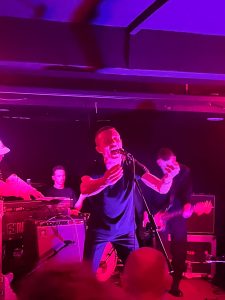
RJ: Indeed – last time we spoke you mentioned the importance of using your phone as a way of documenting or taking notes. Is that still the case?
JL: Yeah, my phone becomes my notepad, and so my demos literally are me going into my phone, and then sending it to Josh and Chad and going, ‘here’s a new bass line’. I’ve got a piano at home, and I write on guitar and piano at home, basically. That’s how a lot of it goes. And like I say, it varies from, whenever the kind of thing hits you to, ‘Oh, that’s a good baseline, or that’s a good lyric’, then if I can write it down, I’ll make a note of it. And then sometimes it is a whole song – the one about the Met Police that I wrote recently… I was just having breakfast when that came. I just had an image of a woman’s legs in this stream. And I thought that was a beautiful image. Well, horrible, but beautiful. And then it just, everything, the whole thing, every single word came. And it’s not changed from that since I wrote it and then recorded it. It’s the fastest I’ve ever turned anything round. I decided that, I guess, more so now is that, I’m just not going to wait around anymore and just need to get stuff done.
RJ: On that basis then, some songs do live around for a while before you make decisions to take forward for the band.
JL: Some will be buzzing around, for instance ‘Care Home’, the Jimmy Savile song. That took a long time to kind of really get my idea of how it would all work out. It was only really when we recorded it and then sort of laid it out in the studio and we kind of really understanded exactly what we wanted from it. It’s an ‘over-the-top’ song. I have to keep a bit of quality control sometimes. I’ve got pads and pads of lyrics and there’s loads of stuff in there that will probably never ever see the light of day until someone goes through all my stuff when I’m dead and goes, ‘what is this!?’
RJ: You must go back through age-old scribblings at times?
JL: Yeah, I’m always flicking back and looking at things. For instance, if we’re in the studio and I don’t have any lyrics, that’s the first thing I’m doing, I’m just going through screeds and screeds of lyrics. And invariably there’s something there. There will be this thing I was writing or this idea that I had or whatever, and quite often I’ve forgotten. There’s been songs that I’ve written, lyrically, that I’ve gone “God, I don’t remember writing THAT!”
RJ: We spoke about mental health before a little bit when we chatted a few years ago. I’m sure you’ll agree that art, be it painting or music or writing, whatever, is a way of catharsis, a way of removing the darker side of things from your own being, everyday life. Tell me if I’m talking bollocks.
JL: No, it does. I mean, yeah, you’re right. It does. I suppose it’s just a way of trying to understand it, I mean, it sounds quite shallow to say that we decided to make an album about a BBC show about murder. I suppose themes in the TV program that weren’t really explored, it becomes part of my thing in my head that I need to write about, Kelly King and her experience [for example]. And I need to talk about these things. I need to understand what it’s like to be a crime scene manager and come home and try and kind of deal with normal life. To even make a TV program of it, it’s not sensationalist. It’s actually a bit boring and a bit depressing. And it is a way of dealing with those sorts of subject matters. And those wider things, you know, those kinds of more global things that we’re seeing at the moment and stuff like that. I’m not going to start writing songs about Israel and Palestine and stuff like that because it’s enough. And trying to get your head around that is insane, isn’t it? It’s cathartic and but it’s also just songwriting.
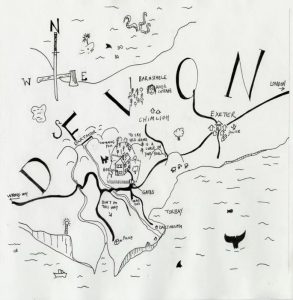
RJ: Are there any topics you wouldn’t touch in terms of songwriting?
JL: if you look a song like ‘The Human’, (‘The Hare, the Moon, the Drone’) which ends with, what do we do to remedy it? It’s talking about how the human heart is basically fundamentally awful. Human being is a terrible thing, right? What do we do to remedy it? Well, endless war and piles of shit. And it’s just talking about exactly what’s happening right now. It’s just war, war, war, and let’s buy lots of stuff to make ourselves feel better. I do touch on those themes, but I’m not, again, it’s not about wagging the finger and saying, “isn’t Netanyahu awful?” (and Hamas, obviously). Because everyone knows and anyone in their right mind must understand that that is really abhorrent what’s happening.. But is there anything that I wouldn’t talk about? There’s things that I’ll still take on.
RJ: What do you find the most interesting subjects to address, does it ever change over time?
JL: It used to be death because I was afraid but I’m not afraid of death anymore. Maybe it’s because of those writing all those songs about it constantly. I don’t know, it’s just the beauty of writing lyrics. I love, and I always have been, a massive fan of lyrics. That’s why I was a Smiths fan, that’s why I was a Cure fan, it was the lyrics, you know? It’s about finding those beautiful moments in lyrics that make me feel like that’s the craft, that’s what I do, that’s who I am. I write songs and many they can be all quite dark with some humour and some chinks of light in it. It’s about trying to find those moments in songs that you get emotional reactions to, whether that’s a laugh, a grin, a cry or whatever.
RJ: What does success for you look like in terms of releasing a new record and how do you feel once it’s ‘out there’ in the world?
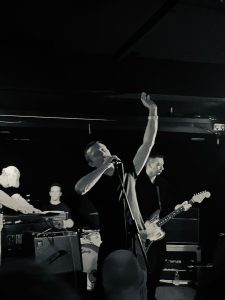
. JL: Partly, it’s like… I was saying that we were in the studio, another child is born at last, off it goes, they’re [the songs] no longer mine anymore. It’s almost like once the lyrics are done and the band’s kind of added all their bits, then it becomes its own thing and it’s left you. And it’s kind of sad and it’s kind of good. So that’s part of it. If it breaks even, brilliant. Yeah. I don’t think I’ve ever had a record that does. My plan is to be more prolific in the next little while. I think my plan is that, you know, we’ll kind of do, be in the studio more frequently, I can’t sit around and wait.
RJ: Please don’t lose the ‘Doom-Wop’ – Even though Murder 24/7 has more than that in it.
JL: Haha, it’s kind of gothic gothstep, it’s got a move from doom-wop into a ‘gothstep’.
RJ: Jacob Lovatt, thank you for taking the time (again) and I wish you all the best. A pleasure as usual.
JL: No worries, and thanks for always thinking of us and giving us a shout, it’s brilliant.
The new record from Jacob Yates and the Pearly Gate Lock Pickers is out now. It’s called Murder 24/7 and you can order it via download or on vinyl
Keep up to date with the future of Jacob Yates and The Pearly Gate Lock Pickers via Errol’s Hot Wax and Instagram
A huge thanks to Stephen McCaffrey for helping make this happen.
